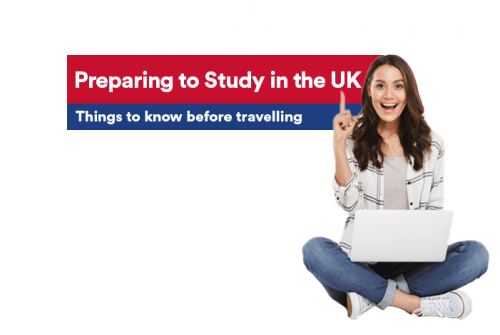Studying and settling in the UK is the dream of every student. Various things need to be considered before reaching the UK. In this blog, you will get to know about 10 things before moving to the UK.

- Financing: Before studying abroad every student should manage their financial documents before applying to the following universities. They should be mentally prepared for further processing. Regarding UK education international students can show their financial documents as bank statements which should have 28 days of maturity or can have educational loans. Here are the sample documents.
- Know about the healthcare system: If you are an international student in the UK, you can use the National Health Service (NHS) by paying an Immigration Healthcare Surcharge (IHS) when you apply for your visa. Once you get your visa, you may begin using NHS services such as doctor's appointments and hospital visits. But not everything is covered. You'll still have to pay for things like dental exams, medications, and eye exams. However, most institutions provide their medical services and counseling to students, frequently for free. There are NHS prescription prepayment vouchers that might help you save money on medicines. You can also register with a dentist when you come for dental care. Some treatments may still be costly, but there is an NHS low-income plan that may assist in paying those costs. In summary, while you have access to many NHS services, certain items may still be costly, but there are ways to make them cheaper.
- Accommodation for international students: Accommodation plays an important role in the university for international students. There are several options available for international students and some options can be found on the university website also. There are various options for international students for accommodation such as halls, university-owned accommodation, and privately owned accommodation. The privately owned accommodation includes rented flats and house shares. If the student chooses university-owned accommodation it helps them to grow up with students from various other countries. For more information, please check out the in-depth blog on student accommodation.
- Traveling: The act of moving from one place to another place by using various means of transportation is known as Traveling. There are various options for people living in the UK aged 16-25 who can get a certain amount of discount by taking a 16-25 Rail card , they will get 1/3 portion of the actual fair . You will get the discount according to the time of your stay in the UK . The rail card can be purchased in various subscriptions like a one-year subscription or three three- year subscription which might cost £30 or £100 for the card. There is also a card for the age group from 26-30 known as the Young Persons Coach card where the students can get a discount on the buses, up to £12.50 per year.
- Job opportunities for international students: International students in the UK are restricted from working for more than 20 hours. After the visa approval detailed information about the course and the personal allowances will be sent with the final approval details. For international students, there are several options when it comes to finding a job. If the students are living in London, they can find a lot of jobs near the university and there are employers to hire those students.
- Student Visas in the UK: For applying for a student visa in the UK the students should be over 16 years old to get a place in a licensed university. Furthermore, there should be proper proof of funding to cover the tuition fees, and living costs, and should have the ability to speak and write in English properly. The students should apply six months before the course starts and should respond within a few weeks. Click here for more information.
- University grading in the UK: There is a grading system in the UK for the undergraduate degree. They use honors, letters, and percentages to grade their degree. After completion of the degree, one of the following four honors qualifications can be achieved. Here is the list of the degrees that students get after achieving the degree.
- First-Class Honors (First) which is equivalent to an A. This requires overall marks of 70% or more than that.
- Upper Second-Class Honors (2:1) which is equivalent to a B. In this grade, students required the overall marks of 60-69 percent.
- Lower Second-Class Honors (2:2) which is equivalent to a C. Here a students required 50-59 percent.
- Third-Class Honors (3rd) which is equivalent to a D grade. Those students who achieve 45-49 percent in their final exam are awarded third-class honors.
- Geography of the UK: England, Northern Ireland, Scotland, and Wales make up the United Kingdom. International students interested in studying in the United Kingdom have the option of attending institutions in any of these four countries. Each of these nations has distinct histories and cultures that foreign students may learn about. This includes various cuisines, distinct dialects, varying political environments, and rich cultural traditions. Exploring these different components helps pupils to get immersed in the rich fabric of the UK's multicultural experience.
- British Courtesy: The UK is home to students from around the globe but there are similarities between them and that is courtesy. The British people are very polite have a very good sense of humor and are very proud of their heritage. Politeness, respect, and various other things play a significant role in the behaviors of the British people. For example, saying sorry before speaking up. Keeping yourself in public transport.
- University culture: The students in the UK are not dedicated only to the classes but also to the social and sports activities organized by the student union. This opportunity allows the students to share their interests and hobbies with their friends.


